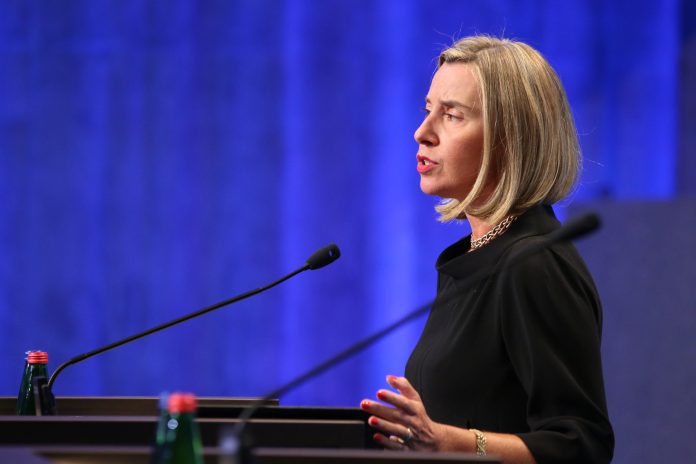Serbia and Montenegro could become the first Western Balkan countries to join the European Union in 2025. They are the only two (among the six) in the EU waiting room that have started membership talks.
Albania and the Former Yugoslav Republic of Macedonia (FYROM) are deemed to be making significant progress, while Bosnia-Herzegovina and Kosovo are further behind.
“The future of the union is not bound to be at 27,” said the EU’s foreign policy chief, Federica Mogherini. She was referring to the number of EU member states that will left once Britain leaves in 2019.
As reported by The Guardian, Mogherini was quick to stress that the 2025 goal was “not a target date, not a deadline”. She said countries would only be able to join through merit-based processes that meant strengthening the rule of law and tackling organised crime and corruption.
In a western Balkans strategy paper published on February 6, the Commission also announced it wanted “a more effective system… to tackle systemic threats to or breaches of the rule of law in any EU member state”.
Titled “A credible enlargement perspective for and enhanced EU engagement with the Western Balkans”, the paper spells out the priorities and areas of joint reinforced cooperation, addressing the specific challenges the Western Balkans face, in particular the need for fundamental reforms and good neighbourly relations.
“Investing in the stability and prosperity of the Western Balkans means investing in the security and future of our Union,” said European Commission President Jean-Claude Juncker. “Although there will be no further enlargements under this mandate, today the European Commission is charting the European path ahead for the Western Balkans. With strong political will, real and sustained reforms, and definitive solutions to disputes with neighbours, the Western Balkans can move forward on their respective European paths. Whether this is achieved will depend on their objective merits.”
“This strategy shows the path that we have ahead of us: for all our six partners to overcome once and for all the past, for all of us together to make the process of the Western Balkans towards the European Union irreversible and keep reuniting the Continent,” said Mogherini. “This Strategy gives all of us a shared, clear, unequivocal, credible and concrete perspective for each and every one of our six partners’ EU integration. The next months will be not only intense but also crucial to make sure that this historic and unique opportunity is seized.”
In turn, European Commissioner for European Neighbourhood Policy and Enlargement Negotiations Johannes Hahn stressed: “With the new approach, underpinned by concrete measures, we are strengthening the enlargement process which requires credible efforts and reforms in return in particular to strengthen the rule of law. We have to work for the benefit of the citizens.”
Commenting on the Commission’s Western Balkans Strategy, the European Peoples Party (EPP) Group in the European Parliament said on February 6 it supports a clear enlargement perspective to all the countries in the region.
“In fact, the EPP has been the only political force to actively promote an enlargement agenda,” said EPP President Joseph Daul. “That’s why I am delighted to see that the Juncker Commission has come forward with a concrete plan to bring the Western Balkan states within the EU. In particular, I would like to congratulate EPP Vice-President and Commissioner Johannes Hahn for his tireless efforts to make the Western Balkans Strategy happen.
“The Western Balkans are our closest partners and are already geographically inside the EU borders. EPP will continue to stay ready and committed to support their integration in the EU and help them on their reform path. But a lot remains to be done,” he added.
The Progressive Alliance of Socialists and Democrats (S&D) Group in the European Parliament also welcomed the EU strategy for the Western Balkans. Victor Boştinaru, S&D vice-president and responsible for the Western Balkans, said: “The Western Balkans are key for the stability and security of the EU and its citizens. We are facing common challenges like migration, radicalisation and terrorism. We cannot risk losing the momentum and must come together to find common answers and solutions to these problems. The European integration of the Western Balkans is in the interests of both sides. That is why the S&D Group has always promoted enlargement as a successful EU foreign policy tool.”
Knut Fleckenstein, S&D MEP and spokesperson on foreign affairs, said the EU’s enlargement strategy must be part and parcel of the EU’s strategic thinking about its own future. “Enlargement requires reforms from the candidate countries, but also preparation from the EU itself. Only timely internal preparation for the accession of new members can ensure that the EU and its institutions continue to function and that citizens’ concerns are addressed properly,” he said.
“The strategy speaks a clear language: the EU wants the Western Balkans to be part of their family of values, shared history and common future,” added S&D vice-president Tanja Fajon. “Since the promises made in Thessaloniki 15 years ago, the European Union has been strongly committed to, and has encouraged, the accession of the Western Balkans Six. This puts a big share of responsibility in the hands of the Western Balkans leaders, who are called upon to grasp this historic opportunity, do the necessary reforms and make their countries more prosperous for their citizens.”

